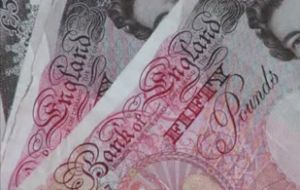MercoPress. South Atlantic News Agency
UK unemployment nears 2 million, sends pound plunging
 British government borrowing in December was $20.5bn
British government borrowing in December was $20.5bn Unemployment in Britain has increased by 131,000 to 1.92 million between September and November, the country's office for national statistics (ONS) has said. Public finances also deteriorated sharply in December, putting them on track for their worst year since records began after the Second World War, the ONS said.
The official jobless is highest figure for more than a decade, leaving the UK's 6.1% unemployment rate higher than Slovenia, Romania, Malta, Holland, the Czech Republic, Bulgaria, Austria and Cyprus. The data, released on Wednesday, dealt another blow to the British pound, still reeling from Tuesday's collapse, as investors fretted about Britain's growing debt burden and the fate of its banks. Howard Archer, an economist at forecasting body Global Insight, said: "Another dire day for the UK economy with data for December showing unemployment soaring, the public finances deteriorating sharply and mortgage lending remaining moribund." The unemployment figures confirmed a flood of redundancies as banks pull credit lines, forcing companies to take cost-saving measures. The organisation's measure of unemployment, which includes those seeking work but not claiming unemployment benefits, rose to 1.923 million, the highest since September 1997, just after the ruling Labour party took office. Philip Shaw, an economist at Investec, a specialist banking group, said: "The rise in unemployment is absolutely awful. There's little doubt whatsoever that the labour market is loosening, and loosening very quickly". Meanwhile, the Conservatives accused employment minister Tony McNulty of being "out of touch" after he said there was "light at the end of the tunnel" shortly after the new data showed UK unemployment hurtling towards two million. TUC general secretary Brendan Barber said: "This is another set of terrible figures, and it is going to get a lot worse before it gets any better. Government must stretch every sinew to get the economy moving again." The ONS said that government borrowing in December was 20.5 billion US dollars, the second highest level after November, since monthly records began in 1993. It took total borrowing in the current financial year to 95 billion, more than double its level at the same point last year and the worst since records started in 1946. As it strives to re-float the economy via extra spending and tax cuts, the government has already pencilled in public sector net borrowing of about 165bn next year and analysts say that figure is likely to climb. Meanwhile, Britain's council of mortgage lenders said on Wednesday that gross mortgage lending fell 47% on the year in December to reach its lowest monthly level since April 2001.




Top Comments
Disclaimer & comment rulesCommenting for this story is now closed.
If you have a Facebook account, become a fan and comment on our Facebook Page!